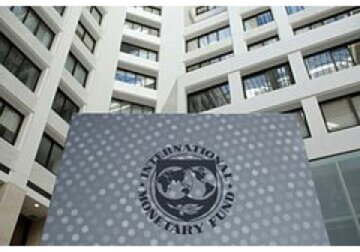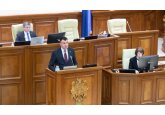
The IMF has approved a new tranche of about $95 million under the existing financing program and accepted a new RSF program worth $173 million for Moldova.
According to the Fund's statement, in particular, the Executive Board of the International Monetary Fund completed the fourth review of the Extended Credit Facility (ECF) and Extended Fund Facility (EFF) for Moldova. This allows for an immediate disbursement of about $95 million, which can be used for budget support, and brings the total disbursements to Moldova under the ECF/EFF arrangements to about $466 million. The IMF Executive Board also approved the extension of the ECF/EFF arrangements for 6 months, until October 19, 2025. The Board also approved a new facility called the Resilience and Sustainability Facility (RSF) of about $173 million. The RSF will support Moldova's efforts to build resilience to climate shocks, support energy sector reforms, enhance domestic financial sector readiness, and mobilize sustainable finance. As noted, Moldova continues to struggle with persistent challenges caused by the consequences of the war in Ukraine. Despite these challenges, the ECF/EFF is being actively implemented: important reforms related to fiscal management, financial sector oversight, and rule of law have been completed. Contingency plans have mitigated the impact of the energy crisis, with progress made in diversifying energy sources and enhancing protection for vulnerable populations during the winter months. Inflation has slowed rapidly due to timely monetary management and lower food and fuel prices. Inflation is expected to recover moderately in 2023, supported by agriculture, consumption and investment growth. Near-term policy priorities are aimed at mitigating the impact of the crisis and supporting the recovery. As risks diminish, policies should increasingly focus on long-term development objectives while maintaining fiscal sustainability. Effective ECF/EFF and RSF reforms, as well as labor market and productivity strengthening, are planned to contribute to long-term sustainable development and convergence to EU income levels. Following the discussions at the Executive Board meeting, IMF Deputy Managing Director and Authorized Chair of the meeting Kenji Okamura said that despite the challenging environment, performance under the ECF/EFF remains strong. Spillover effects from the war in Ukraine continue to weigh heavily on the Moldovan economy. The impact of the energy crisis has been partially mitigated by the introduction of effective contingency plans, and progress has been made in diversifying energy sources. Inflation has slowed faster than expected, thanks to a well calibrated monetary policy response and a rapid decline in food and fuel prices. Inflation growth is projected to moderate in the near term, supported by improving domestic demand. He noted that, despite the difficult conditions, Moldova showed resilience and maintained a strong reform momentum. The authorities' reform agenda is duly focused on strengthening the rule of law, anti-corruption institutions and mechanisms, as well as fiscal management. These measures are well aligned with the EU accession program and will strengthen growth. Nevertheless, the outlook is subject to high uncertainty given the continuation of the war and the persistence of its effects. "Fiscal policy should remain focused on mitigating the impact of the multiple crises, supporting the recovery, and advancing longer-term reforms. Near-term policy should continue to support the most vulnerable and safeguard energy security. Over the medium term, fiscal consolidation, while addressing development needs, is important to preserve fiscal and debt sustainability," said Kenji Okamura. According to him, the monetary policy stance is adequate and should remain data-driven and forward-looking. Further progress in strengthening the independence of the National Bank of Moldova will contribute to maintaining policy credibility and effectiveness. Maintaining financial sector stability and expanding access to financial services is important. Measures to strengthen the labor market and maintain the momentum of state enterprise and governance reforms are needed to contain fiscal risks, build confidence in public institutions, and improve the business environment. The new RSF Program is planned to support Moldova's investments in building resilience to climate shocks, stimulating financing for adaptation and mitigation, supporting energy sector reforms, and increasing the readiness of the domestic financial sector to mobilize sustainable finance. IMF Executive Directors agreed with the main points of the Fund staff assessment of the discussions with the Moldovan authorities during the last mission. They commended the authorities for their active engagement in program implementation and their effectiveness under the ECF/EFF arrangements and expressed the view that the new RSF arrangement would help strengthen efforts to build climate resilience. Directors cautioned that despite a favorable outlook, Moldova continues to face significant headwinds from multiple crises and large downside risks, including spillover effects from the war in Ukraine and energy shocks. They called for continued focus on mitigating shocks, promoting economic recovery, supporting sustainable, green growth, and EU accession efforts. Directors agreed that fiscal policy should remain focused on mitigating the impact of multiple crises, supporting recovery, and advancing long-term reforms. They emphasized that in the near term, fiscal policy should continue to support the most vulnerable and ensure energy security. In the medium term, fiscal consolidation, along with addressing development needs, is important for maintaining fiscal and debt sustainability. Directors welcomed the authorities' plans to strengthen revenue mobilization and improve the quality and efficiency of spending. They recommended measures to improve the management of public finances and address under-implementation of the current expenditure budget. IMF Directors noted the National Bank's strong and timely response to contain high inflation and recommended that monetary policy remain data-driven and forward-looking. Directors noted the need to further reduce high reserve requirements to support bank liquidity and credit intermediation. They emphasized that further progress in strengthening central bank independence would help maintain policy credibility and effectiveness. IMF Directors emphasized the importance of maintaining financial sector stability, strengthening surveillance, and expanding access to financial services. They noted recent reforms to strengthen governance, fight high-level corruption, and strengthen the rule of law. Important measures include strengthening the labor market and improving the efficiency of state-owned enterprises. IMF Directors emphasized that maintaining the momentum of these reforms is critical to contain fiscal risks, build confidence in public institutions, and improve the business environment. They noted that the new RSF program will support Moldova's efforts to build resilience to climate shocks, implement reforms in the energy sector, and ensure the mobilization of sustainable finance. // 08.12.2023 – InfoMarket







